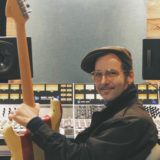
In March, Austin’s SXSW festival, a mainstay of the city’s musical life for 34 years, canceled their live events. Chris “Frenchie” Smith, co-owner of the Bubble recording studio and guitarist for Austin rock band Sixteen Deluxe described the moment he heard the news: “I’ve lived in Austin for thirty years, and South by Southwest getting canceled was something that seemed unfathomable. It was like the Grinch had stolen Christmas.”
Seven months later, with many industry professionals predicting the summer of 2021 as the earliest possible return of live music, large-format recording studios like Austin’s The Bubble are keeping the music industry moving forward.
The Bubble began in 1998, in a warehouse used as a recording and rehearsal space for Sixteen Deluxe. Over the next several years, the studio evolved, with Smith’s partner Alex Lyon, into a viable business dedicated to discovering and nurturing new talent in a state-of-the-art studio space located in the historic Hyde Park neighborhood in central Austin. In addition to offering a proving ground for young talent, the studio has been an oasis for established acts like the Meat Puppets, the Dandy Warhols, the Toadies, and the legendary Lemmy Kilmister of Motörhead.
The name of the studio is a metaphor that encapsulates its business model. Smith says, “Once people come here, your music is in a safe place. It’s not a cool kid’s club. Musically and spiritually, it’s the people’s studio.” The recording space allows bands to play together in the same room to fine-tune songwriting and performance details. This has become increasingly important when musicians don’t have the opportunity to develop those details over months of touring. Although shortcuts are available in the studio, Smith and the Bubble crew take the time to produce music that will last. Working in an industry that focuses on the bottom line, Smith realizes, “Cashing in on forgettable music that turns a quick profit is not a sustainable business model. If the ceiling of the business is closing in on all of us, let’s just cut the crap and make great music.”
The Bubble’s goal of creating a safe space for music has now been combined with the necessity for a safe physical space. Smith knew the studio had to adapt quickly, instituting a mask policy, social distancing measures, and verbal screening for everyone in the studio. The “full-disclosure” questioning opens up communication lines vital to a successful recording session.
Smith and Lyon have also taken on the personal responsibility of sterilizing the studio. For Smith, even the most mundane task can spark creativity. He sees it as an opportunity to discover “new sounds” in the remote corners of the studio’s acoustical space, designed by the late Mark Genfan, taking notes as he cleans.
Singing poses a unique challenge when guarding against the virus. Luckily, the studio has acquired a massive stock of equipment over the years. So, after a session, a microphone is never reused by a different singer until it has spent sixty days in quarantine. Smith says, “If it’s a really good vocal, God knows what’s happening to that microphone.”
Although a lack of touring income and travel opportunities has led to some postponed recording sessions, the Bubble continues to operate. During the pandemic, sessions with a musically diverse lineup of up-and-coming musicians including blues phenom Jackie Venson, hip-hop artist Deezie Brown, and Kentucky-based Americana group The Jenkins Twins have been especially fruitful. “Before, we understood it was a pleasure to work together, but now we understand that it’s a real privilege. I only see artists giving me some of the best performances I’ve ever heard in my career.”
Independent studios like the Bubble offer a platform for new artists to develop outside of a system that often tries to just turn a quick profit at the expense of amplifying unique voices.
In Smith’s view, “underestimating anyone is a huge mistake in music right now.”





Leave a comment